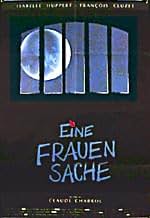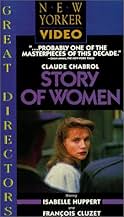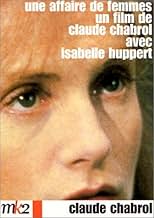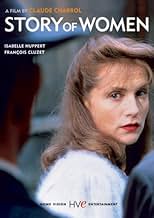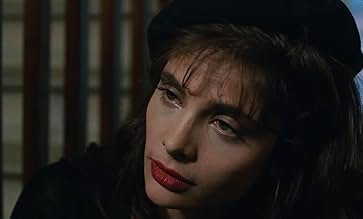IMDb-BEWERTUNG
7,5/10
6155
IHRE BEWERTUNG
Eine Hausfrau im nationalsozialistisch besetzten Frankreich kämpft um ihren Lebensunterhalt, als ihr Mann nach einer Kriegsverletzung nach Hause zurückkehrt.Eine Hausfrau im nationalsozialistisch besetzten Frankreich kämpft um ihren Lebensunterhalt, als ihr Mann nach einer Kriegsverletzung nach Hause zurückkehrt.Eine Hausfrau im nationalsozialistisch besetzten Frankreich kämpft um ihren Lebensunterhalt, als ihr Mann nach einer Kriegsverletzung nach Hause zurückkehrt.
- Auszeichnungen
- 14 Gewinne & 8 Nominierungen insgesamt
Empfohlene Bewertungen
This is a true story and the heroine is not unlike Louis Malle's hero "Lacombe Lucien".They are too coarse,too immature to realize what they are doing.Lucien could have opted for the Resistance,but he's deemed too stupid by the schoolteacher and he winds up in Collaboration.Chabrol's heroine only wants to "help" her neighbors before she realizes she can earn a lot of dough with abortion.Chabrol watches his character as an entomologist,as she makes her way through those troubled times:the world has gone mad,and anyway is abortion worse than what the authorities are doing with the Jews ?Maréchal Petain's France was so humiliated that it tried to make up with it by focusing on "morality".
The heroine could make also think of Violette Nozières,another Chabrol movie which also featured Huppert.And she's also akin to Sandrine Bonnaire's character in "la cérémonie".All are women overtaken by events,all are victims of a well-meaning society,Chabrol's trademark. "Une affaire de femmes" is certainly a good work although it lacks the sweep and the directing innovations of his late sixties/early seventies classics.
The heroine could make also think of Violette Nozières,another Chabrol movie which also featured Huppert.And she's also akin to Sandrine Bonnaire's character in "la cérémonie".All are women overtaken by events,all are victims of a well-meaning society,Chabrol's trademark. "Une affaire de femmes" is certainly a good work although it lacks the sweep and the directing innovations of his late sixties/early seventies classics.
Claude Chabrol's "Une affaire de femmes" takes us back to the challenging times of World War II, exploring the life of Marie, portrayed with depth and complexity by Isabelle Huppert. Set against the backdrop of a war-torn France, the film delves into the moral intricacies of survival, collaboration, and the consequences of one woman's choices.
The narrative unfolds as Marie, left alone with her two children during the wartime, faces the grim reality of a defeated nation. Huppert's performance brings a nuanced portrayal of Marie as she navigates through a tumultuous period, discovering her unexpected skill in performing abortions, a secret source of income during these dire times.
The film refrains from passing moral judgment on Marie's actions, leaving room for the audience to grapple with the ethical complexities of her decisions. François Cluzet complements Huppert's portrayal with his role as Marie's husband, whose jealousy and actions set the stage for the unfolding tragedy.
Chabrol, a master of suspense and a seasoned storyteller, weaves a narrative that transcends the specifics of its wartime setting. The movie serves as a poignant commentary on the broader themes of collaboration, morality, and the resilience of the human spirit in the face of adversity.
"Une affaire de femmes" captures the essence of Claude Chabrol's ability to dissect societal norms and individual choices. The film, although set against the backdrop of WWII, resonates with timeless themes, leaving the audience with much to contemplate. Huppert's compelling performance, supported by a strong cast, makes this film a standout in Chabrol's body of work.
The narrative unfolds as Marie, left alone with her two children during the wartime, faces the grim reality of a defeated nation. Huppert's performance brings a nuanced portrayal of Marie as she navigates through a tumultuous period, discovering her unexpected skill in performing abortions, a secret source of income during these dire times.
The film refrains from passing moral judgment on Marie's actions, leaving room for the audience to grapple with the ethical complexities of her decisions. François Cluzet complements Huppert's portrayal with his role as Marie's husband, whose jealousy and actions set the stage for the unfolding tragedy.
Chabrol, a master of suspense and a seasoned storyteller, weaves a narrative that transcends the specifics of its wartime setting. The movie serves as a poignant commentary on the broader themes of collaboration, morality, and the resilience of the human spirit in the face of adversity.
"Une affaire de femmes" captures the essence of Claude Chabrol's ability to dissect societal norms and individual choices. The film, although set against the backdrop of WWII, resonates with timeless themes, leaving the audience with much to contemplate. Huppert's compelling performance, supported by a strong cast, makes this film a standout in Chabrol's body of work.
With cool detachment and a subtle touch of horror, Claude Chabrol dissects the story of a woman who was guillotined during the Nazi occupation of France. One of his strengths as a director is that he allows the movie goer to form his/her own thoughts and opinions about the issues at hand. He is not a proselytizer.
The film covers a lot of ground: illegal abortion, collaborating with the enemy, parenting, marital communication, greed and a slew of other human weaknesses. All of this against the backdrop of an occupied France, a country who witnessed the horrors of WWI and never fully recovered, and whose WWII soul (what is left of it) has been torn apart.
Isabelle Huppert does a fine job interpreting Marie LaTour, the woman in question. Marie is not the most sympathetic of characters. In fact, most of the major characters are not "sympathique".(My favorite character is the prostitute Lulu, acted by Marie Trintignant.)
All in all a well directed, well structured film about a tragic period in the lives of the French people. But you be the judge.
Trivia: "Vera Drake" and "L'Affaire de Femmes" both begin in apartments which have the the same god awful green walls.
The film covers a lot of ground: illegal abortion, collaborating with the enemy, parenting, marital communication, greed and a slew of other human weaknesses. All of this against the backdrop of an occupied France, a country who witnessed the horrors of WWI and never fully recovered, and whose WWII soul (what is left of it) has been torn apart.
Isabelle Huppert does a fine job interpreting Marie LaTour, the woman in question. Marie is not the most sympathetic of characters. In fact, most of the major characters are not "sympathique".(My favorite character is the prostitute Lulu, acted by Marie Trintignant.)
All in all a well directed, well structured film about a tragic period in the lives of the French people. But you be the judge.
Trivia: "Vera Drake" and "L'Affaire de Femmes" both begin in apartments which have the the same god awful green walls.
'Une affaire de femmes' (the English distribution title was 'Story of Women'), Claude Chabrol's 1988 film gives Isabelle Huppert the opportunity to create one of the most memorable roles of a formidable career. Chabrol, the director about whom Huppert would posthumously say that he filmed her like a father, sets his drama in the period of World War II and the occupation, bringing to screen the biography of the last woman to be sentenced to death and executed in the history of France. The charge was the practice of illegal abortions, and the exemplary punishment was a consequence of the moral and national decay of the Vichy collaborationist regime. The pro-life vs. Pro-choice are still current in many countries of the world today (not in France), but that is not the main theme of the film. In fact, Chabrol avoids any moral judgment on one side or the other of this dispute. His target is - as in many of his other films - the French bourgeoisie during the war, in one of the most abysmal periods of its history, a period marked by collaboration, corruption, immorality and hypocrisy.
The story takes place in the months and the first years after the defeat of France, the occupation of part of the country's territory and the installation in Vichy of a collaborationist government under the leadership of Marshal Petain. Marie is one of many young women left behind alone with two children to care for after her husband leaves for war. She is a simple woman living in a provincial town whose dreams of becoming a singer or even of leading a normal life have been dashed by the war. Somewhat by chance, while helping a neighbor friend, she discovers her ability to perform abortions. The return of her husband does not improve the family situation, on the contrary. Paul, traumatized by the war, becomes an extra burden, and any spark of love that may have existed between the two is now extinguished. Marie decides to turn her talent for helping other women into a source of income. There is no shortage of opportunities. Many women left alone are forced to look for support among occupiers or collaborators, and the children resulting from these relationships are unwanted burdens and risk compromising the mothers morally and socially. Marie's business prospers, the woman begins enjoy her better life, she also takes a lover, while asking herself few questions about what she is doing. However, the jealous husband does not accept the situation.
Isabelle Huppert is perfect in such roles, where facts are ambiguous and feelings repressed. Neither the screenwriters nor the director insist on making any moral judgment about the woman's actions. When she is caught, tried and condemned by a system that wants to make her a punishable example of immorality, the filmmakers' compassion seems to shift more towards the children left behind and destined to remain motherless. Huppert's Marie combines innocence with carelessness, love for children with a desire to live her life at all costs. It's a complex and interesting character, one of the best roles of his career. François Cluzet is her acting partner as the husband whose deeds as a sort of catalyst for the woman's downfall. As for Chabrol, during this period he had filtered and decanted all the lessons of New Wave cinema and had reached a remarkable efficiency and acuity of his means of expression - both in writing the story (inspired by a book by Francis Szpiner - jurist and politician, nowadays mayor of a Parisian arrondissement) but also in working with the camera. With restraint and without pathos, 'Une affaire de femmes' is one of the harshest cinematic indictments of French collaborationism and a statement of compassion for its victims.
The story takes place in the months and the first years after the defeat of France, the occupation of part of the country's territory and the installation in Vichy of a collaborationist government under the leadership of Marshal Petain. Marie is one of many young women left behind alone with two children to care for after her husband leaves for war. She is a simple woman living in a provincial town whose dreams of becoming a singer or even of leading a normal life have been dashed by the war. Somewhat by chance, while helping a neighbor friend, she discovers her ability to perform abortions. The return of her husband does not improve the family situation, on the contrary. Paul, traumatized by the war, becomes an extra burden, and any spark of love that may have existed between the two is now extinguished. Marie decides to turn her talent for helping other women into a source of income. There is no shortage of opportunities. Many women left alone are forced to look for support among occupiers or collaborators, and the children resulting from these relationships are unwanted burdens and risk compromising the mothers morally and socially. Marie's business prospers, the woman begins enjoy her better life, she also takes a lover, while asking herself few questions about what she is doing. However, the jealous husband does not accept the situation.
Isabelle Huppert is perfect in such roles, where facts are ambiguous and feelings repressed. Neither the screenwriters nor the director insist on making any moral judgment about the woman's actions. When she is caught, tried and condemned by a system that wants to make her a punishable example of immorality, the filmmakers' compassion seems to shift more towards the children left behind and destined to remain motherless. Huppert's Marie combines innocence with carelessness, love for children with a desire to live her life at all costs. It's a complex and interesting character, one of the best roles of his career. François Cluzet is her acting partner as the husband whose deeds as a sort of catalyst for the woman's downfall. As for Chabrol, during this period he had filtered and decanted all the lessons of New Wave cinema and had reached a remarkable efficiency and acuity of his means of expression - both in writing the story (inspired by a book by Francis Szpiner - jurist and politician, nowadays mayor of a Parisian arrondissement) but also in working with the camera. With restraint and without pathos, 'Une affaire de femmes' is one of the harshest cinematic indictments of French collaborationism and a statement of compassion for its victims.
This earns a high rating simply for the gritty, persuasive performance from it's star, Isabelle Huppert, who is called upon to be a mother and an abortionist, to be a lover and a murderer, to be a free spirit and a prisoner of Nazi tyranny; Huppert may never gain your sympathy, and doesn't play for it, but she should gain your understanding as she plays a true-to-life story of a woman severely punished by the French government for a woman's crime that the dominant culture can not countenance because of the political atmosphere at the time--all this, and it's a gripping story,too--but not at all a cheerer-upper.
When you have finished watching this film, you may find Huppert's character hasn't quite finished with you, an observant, quiet reminder of the consequences of our actions. Hers is a haunting performance.
When you have finished watching this film, you may find Huppert's character hasn't quite finished with you, an observant, quiet reminder of the consequences of our actions. Hers is a haunting performance.
Wusstest du schon
- WissenswertesBased upon the true story of Marie-Louise Giraud, with character names changed.
- SoundtracksLe Poème de l'Amour et de la Mer
Written by Ernest Chausson
Top-Auswahl
Melde dich zum Bewerten an und greife auf die Watchlist für personalisierte Empfehlungen zu.
- How long is Story of Women?Powered by Alexa
Details
- Erscheinungsdatum
- Herkunftsland
- Offizieller Standort
- Sprachen
- Auch bekannt als
- Story of Women
- Drehorte
- Coulommiers, Seine-et-Marne, Frankreich(interiors: women's prison)
- Produktionsfirmen
- Weitere beteiligte Unternehmen bei IMDbPro anzeigen
Box Office
- Bruttoertrag in den USA und Kanada
- 438.483 $
- Laufzeit1 Stunde 48 Minuten
- Sound-Mix
- Seitenverhältnis
- 1.66 : 1
Zu dieser Seite beitragen
Bearbeitung vorschlagen oder fehlenden Inhalt hinzufügen



